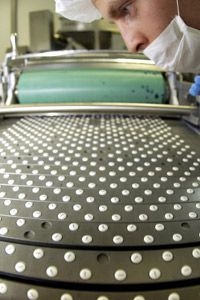Brand names: Bayer, Advil, Motrin, Aleve
What they are: You know how acetaminophen doesn't do a darn thing to reduce inflammation? Well, NSAIDs pick up that dropped ball and run all the way into the endzone with it. Short for nonsteroidal anti-inflammatory drugs, the category of NSAIDs include a variety of analgesics, like aspirin (one brand name is Bayer), ibuprofen (Advil, Motrin) and naproxen (Aleve). Although there's some variation by particular type, NSAIDs in general treat inflammation by blocking the production of chemicals called prostaglandins, which encourage fever, pain and inflammation. Incidentally, steroidal meds also reduce inflammation, which is why this category goes out of its way to denote "nonsteroidal" in the name because it's a major distinction.
When to take them: "NSAIDs such as aspirin, ibuprofen, and naproxen have specific mechanisms of action in the body which decrease inflammation, so those with inflammatory conditions such as osteoarthritis, rheumatoid arthritis, menstrual pain, or muscular pain would benefit from an NSAID," Thompson notes. "Naproxen tends to work longer in the body (about two times longer!), so those with gout or more chronic pain conditions may see more pain relief from using naproxen versus ibuprofen." However, ibuprofen provides quicker relief than naproxen and is less likely to cause an upset stomach, so might be more appropriate for acute pain.
Aspirin has long been used as a daily supplement of sorts for people at risk of heart attack and stroke because it inhibits potentially tragic blood clotting for roughly four to seven days. One important caveat, however, is that people consuming aspirin for that purpose should use a lower dosage aspiring (under 325 milligrams per day) than those using it for pain relief purposes. Thompson says that aspirin is more commonly used nowadays for inhibiting blood clotting than for relieving pain, due to intestinal bleeding risks, which brings us to...
When NOT to take them: Women who are pregnant or trying to become pregnant are typically advised to avoid use of NSAIDs because they are believed to cause fertility issues, early miscarriage and even birth defects. In particular, they should not be taken in the third trimester because they could cause premature closure of the ductus arteriosus (a blood vessel in the developing baby).
People with gastrointestinal problems might also steer clear of NSAID use. "NSAIDS are known for their potential negative GI side effects, which can include ulcers or intestinal bleeding," Thompson says. This occurs because prostaglandins, those fever- and inflammation-encouraging chemicals that are wrecked by NSAIDs, aren't all bad. In fact, prostaglandins protect the stomach lining and help with blood clotting. When those functions are inhibited, the risk of bleeding and ulcers goes way up.
"Although this is more likely in those who take large doses for long periods of time, patients often turn to acetaminophen [from NSAIDs] for pain relief, since it does not cause intestinal issues," says Thompson.
Still confused about which to take? "Your local pharmacist at any retail pharmacy can help recommend the best medication and dose to take for your particular condition, and can help you find the right product on the shelf," she adds.


